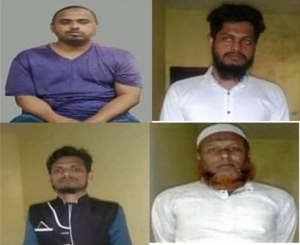The arrest of five terrorists affiliated with al-Qaida in the northeastern Indian state of Assam has fueled speculation about the organization’s network in other parts of the country.
Within hours of their arrest on March 5, Assam police chief Bhaskar Jyoti Mahanta told a local television news channel that the probe into the outfit’s activities would be conducted by a premier investigating agency of the country.
India’s National Investigation Agency (NIA) has asked the Ministry of Home Affairs for permission to launch the probe which is expected to cover many states across the country.
Among those arrested by the police was a Bangladeshi national Saiful Islam, alias Harun Rashid, who had settled at Barpeta in Assam and was engaged with a mosque in Dhakalipara. The four others in the module linked to the Ansarullah Bangla Team (ABT) were locals from the district who were indoctrinated by Saiful.
ABT is affiliated with al-Qaida in the Indian Subcontinent (AQIS). The objective of Saiful’s team was to develop Barpeta, which is located about 100 kilometers to the west of the state capital Guwahati, as a base for jihadi activities.
NIA’s decision for the probe was prompted by the findings of Assam Police on the terror module ahead of the crackdown on March 5 at Barpeta. Police are of the firm opinion that the terror squad’s activities could span into other states in the country.
“Saiful was sent to Assam from Bangladesh by the ABT’s second-in-command in 2019,” Mahanta said, adding that “he had come to the state earlier as well on a couple of occasions.”
“We do not think such activities have the support of the Muslim populace in Assam,” Mahanta, the police chief said, pointing out that the police had “received information about the activities of this group from some people among the community.”
So far, the police investigation has revealed some details about the module that had been operating in Assam since last year. Information about the group’s activities had reached the Special Branch of Police in September last year following which a successful effort was made to infiltrate the group.
Saiful, who hails from Narayanganj in Bangladesh, entered India through the Bangladesh border in West Bengal with the assistance of touts, He had received “professional training” to evade detection and capture by police.
According to information received by the Special Branch, Saiful had told his close associates that weapons and mercenaries could be brought to Assam from foreign destinations at an “appropriate time” for executing operations.
The group had organized maswaras or consultative sessions at several places in Assam in order to identify leaders for setting up sleeper cells. There is evidence of funds received from abroad that was invested in various businesses. The group had formed a front company to camouflage their travel to different states of the country and to Bangladesh.
Several incidents involving al-Qaida operatives have come to light in recent years. In 2014, Ayman al-Zawahiri had announced the creation of AQIS, the Indian branch of his militant group, to further the cause of jihad across South Asia. Assam was among the three states in India which found mention in his message exhorting the umma or Muslim nation to wage jihad against its enemies.
The same year, Sahanur Alom was arrested from Barpeta for his involvement in a bomb blast in West Bengal. Alom, who was a member of the Jamaat-ul-Mujahideen Bangladesh (JMB), had recruited four other persons to the group who were also arrested.
Last year two Neo Jamaat-ul-Mujahideen Bangladesh (Neo JMB) functionaries were arrested with weapons and fake Indian currency notes from Dhubri in Assam. Dhubri borders Bangladesh. Police believe that some sleeper cells have already been created by the outfit in Assam, which are yet to be busted.
Assam shares a 262-kilometer long border with Bangladesh, of which 201 kilometers have been fenced. There are porous stretches along the border in the state and in neighboring states that facilitate smuggling and infiltration.
Assam has been adversely impacted by illegal immigration from Bangladesh and Nepal over the past several decades, which originated during colonial rule. Large numbers of Hindus and Muslims, including refugees occupied vast tracts of land in Assam triggering conflicts with local communities at regular intervals.
A large proportion of people from these communities are ineligible for citizenship as per the norms laid down by the Indian government and agreements reached between the government and civil society organizations in Assam. The government has also been unable to put in place an efficient mechanism for detection of foreign nationals in the state many of whom have allegedly acquired fake documents.
Indian security agencies are apprehensive that the terror modules could find support among a section of Bengal-origin Muslims in Assam, who are either illegal immigrants or influenced by radical ideas. They have identified a few “vulnerable zones” and beefed up surveillance there.
































